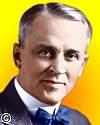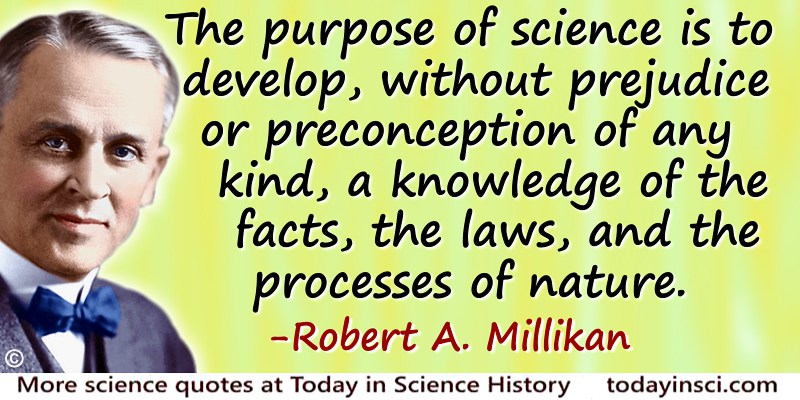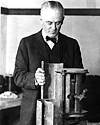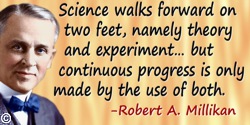 (source)
(source)
|
Robert Andrews Millikan
(22 Mar 1868 - 19 Dec 1953)
American physicist whose famous oil-drop experiment determined the charge on the electron, which also showed the electron was a fundamental, discrete particle.
|
Robert Andrews Millikan
“The purpose of science is to develop…a knowledge…of nature.”
Illustrated Quote - Large (800 x 400 px)
More Robert Andrews Millikan quotes on science >>
This quote comes from a statement prepared by Robert Millikan to express that science and religion are not antagonistic, but complementary. When written, in 1923, Darwin’s theory of evolution was more than a half-century old, but there still was resistance to accepting it among a certain number of laymen. In fact, within the following couple of years, there would be a law in Tennessee passes to prevent the theory being taught in the public schools of that state. This resulted in the famous Scopes Monkey Trial.
The statement was first published in the journal, Science.1 It was re-published from the Boston Transcript with introductory remarks in the Bulletin of the American Association of College Professors:
Science And Religion.—“In a joint statement representative groups of scientists, religious leaders, and men of affairs unite in declaring that science and religion. 'meet distinctive human needs and in the rounding out of human life they supplement rather than displace or oppose each other.’ This is intended to counteract anti-evolution and anti-science propaganda as well as anti-religious movements. Dr. R. A. Millikan, physicist and director of the Norman Bridge Laboratory of Physics at Pasadena, Calif., who formulated and secured the signatures to the statement, said in explaining its object:
“‘The purpose is to assist in correcting two erroneous impressions which seem to be current among certain groups of uninformed persons. The first is that religion today stands for mediaeval theology; the second that science is materialistic and irreligious.’”
The full statement and signatories are:
We, the undersigned, deeply regret that in recent controversies there has been a tendency to present science and religion as irreconcilable and antagonistic domains of thought, for in fact they meet distinct human needs, and in the rounding out of human life they supplement rather than displace or oppose each other.
The purpose of science is to develop, without prejudice or preconception of any kind, a knowledge of the facts, the laws, and the processes of nature. The even more important task of religion, on the other hand, is to develop the consciences, the ideals, and the aspirations of mankind. Each of these two activities represents a deep and vital function of the soul of man, and both are necessary for the life, the progress, and the happiness of the human race.
It is a sublime conception of God which is furnished by science, and one wholly consonant with the highest ideals of religion, when it represents Him as revealing Himself through countless ages in the development of the earth as an abode for man and in the age-long inbreathing of life into its constituent matter, culminating in man with his spiritual nature and all his God-like powers.
The signers are:
Bishop William Lawrence; Bishop William Thomas Manning; Dr. Henry Van Dyke; Dr. James I. Vance; President Clarence A. Barbour; President Ernest D. Burton; President Henry Churchill King; Dr. Robert E. Brown; Bishop Francis John McConnell; Dr. Peter Ainslie; Charles D. Walcott; Henry Fairfield Osborne; Edwin Grant Conklin; James Rowland Angell; John Merle Coulter; Michael I. Pupin; William James Mayo; George David Birkhoff; Arthur A. Noyes; William Wallace Campbell; John J. Carty; Robert A. Millikan; William Henry Welch; John C. Merriam; Gano Dunn; Herbert C. Hoover; James John Davis; David F. Houston; Frank O. Lowden; John Sharp Williams; Rear Admiral William S. Sims; Harry Bates Thayer; Julius Kruttschnitt; Frank A. Vanderlip; Henry S. Pritchett.
One of those signers was Herbert C. Hoover, a quaker, who would become the 31st President of the United States in 1929. At the time he signed, he was Secretary of Commerce, but previously had become internationally-known as a mining engineer.
There followed a commentary. Notice the reference to the rewriting of “our textbooks in science to suit a single sect.” Nearly a century later we are still facing the same issues. Because it is interesting to compare what was being said then with the issue as it is in the present, here is the complete commentary by Dr.Edwin E. Slosson that followed the lists of signers:
Dr. Edwin E. Slosson says of this: “Timid souls who have become alarmed at the idea that religion and science are inevitable antagonists should be assured by the ‘Joint Statement Upon the Relations of Religion and Science,’ signed by a number of the foremost scientists, religious leaders and men of affairs of the United States. These distinguished thinkers in various fields found it easy to agree upon a simple statement of their opinion of the relation of religion and science and their belief that both have a place in modern life. No one can question either the ability or sincerity of such men as these and since their adhesion to the declaration is purely voluntary it is evident that they find no essential incompatibility between a personal religious faith and a scientific view of the universe.
“The list of signers could be extended indefinitely, in fact the statement probably represents in general the position of most of the educated and moderate minded men of our time and country.
“It is a curious feature of the present situation that the laity is more alarmed over the advances of science than the clergy. That is, those who know the most about theology and who have most at stake in the church are most willing to welcome historical criticism and scientific research. The real conflict is not between science and religion as such, but rather between dogmatic and intolerant religionists and scientists on the one side, and liberal and tolerant religionist and scientists on the other side. It is more a difference of temperament than of opinion. The effort to fetter freedom of investigation or to force thought into fixed formulas is equally fatal in science and religion.
“Overmuch fear of heresy indicates lack of faith. Scientific men have such absolute confidence in the validity of the scientific method that they permit their most fundamental principles to be challenged even in their own societies. Chemists listen without a shudder to destructive attacks upon the immutability of the elements and the indivisibility of the atom. The Royal Society of London even applauds a speaker who sets an upstart foreigner like Einstein above Newton, one of its oldest and most venerated members.
“The papers have reported a half dozen cases of professors who have been dismissed from educational institutions under ecclesiastical control for teaching evolution but there has been no retaliation from those whom some call the ‘enemies of religion.’ I never heard of the National Academy of Sciences expelling a member because he was suspected of being a Presbyterian or of the American Association for the Advancement of Science blackballing a man because he had been baptized. Girard College is the only institution that excludes clergymen by charter and I understand that the doorkeeper there is not very vigilant in searching every visitor to see if he has a dogma concealed about his person. If we begin to rewrite our textbooks in science to suit a single sect, or section of a sect, we may soon have Methodist and Baptist zoologies, Protestant and Catholic chemistries, Jewish and Christian theories of gravitation, as we now have northern and southern histories, and proletarian and capitalistic economics.
“Science and religion, properly understood, need never conflict, but should always cooperate in the advancement of the human race, for each supplies what the other lacks. Science provides the means by which human toil and suffering may be alleviated and shows how human life may be lengthened and enhanced. Religion gives inspiration to the individual, an aspiration to a high ideal. Science gives eyes to religion. Religion gives a heart to science. Knowledge is power. But power is impotent unless set in action and dangerous if set in action by the wrong motive. Religion, unless enlightened by science, wastes its energies in vague longings or in fruitless and sometimes harmless efforts to remedy bodily or social ills.
“Science may discover what conduct is most conducive to human welfare in the future. But science as such cannot go beyond this. It can point out the best way but it cannot inspire the individual voluntarily to follow it against his personal interest. Mere knowledge cannot of itself supply the motive for self-sacrifice for others or for the future. It cannot make a mother risk her life for her child or a man risk his for his country. The altruistic impulse is a religious instinct, whether it is recognized as such or not. Science can supply the motive power. Religion must supply the motive.”
- Science Quotes by Robert Andrews Millikan.
- 22 Mar - short biography, births, deaths and events on date of Millikan's birth.
- Robert Andrews Millikan - context of quote “The purpose of science is to develop…a knowledge…of nature.” - Medium image (500 x 250 px)
- Robert Andrews Millikan - context of quote “The tendency to distort the facts” - Medium image (500 x 250 px)
- Robert Andrews Millikan - context of quote “The tendency to distort the facts” - Large image (800 x 400 px)
- Robert Andrews Millikan - context of quote “Science walks forward on two feet” - Medium image (500 x 250 px)
- Robert Andrews Millikan - context of quote “Science walks forward on two feet” - Large image (800 x 400 px)
- The electron: Its isolation and measurement and the determination of some of its properties, by Robert Andrews Millikan. - book suggestion.
- Booklist for Robert Millikan.








